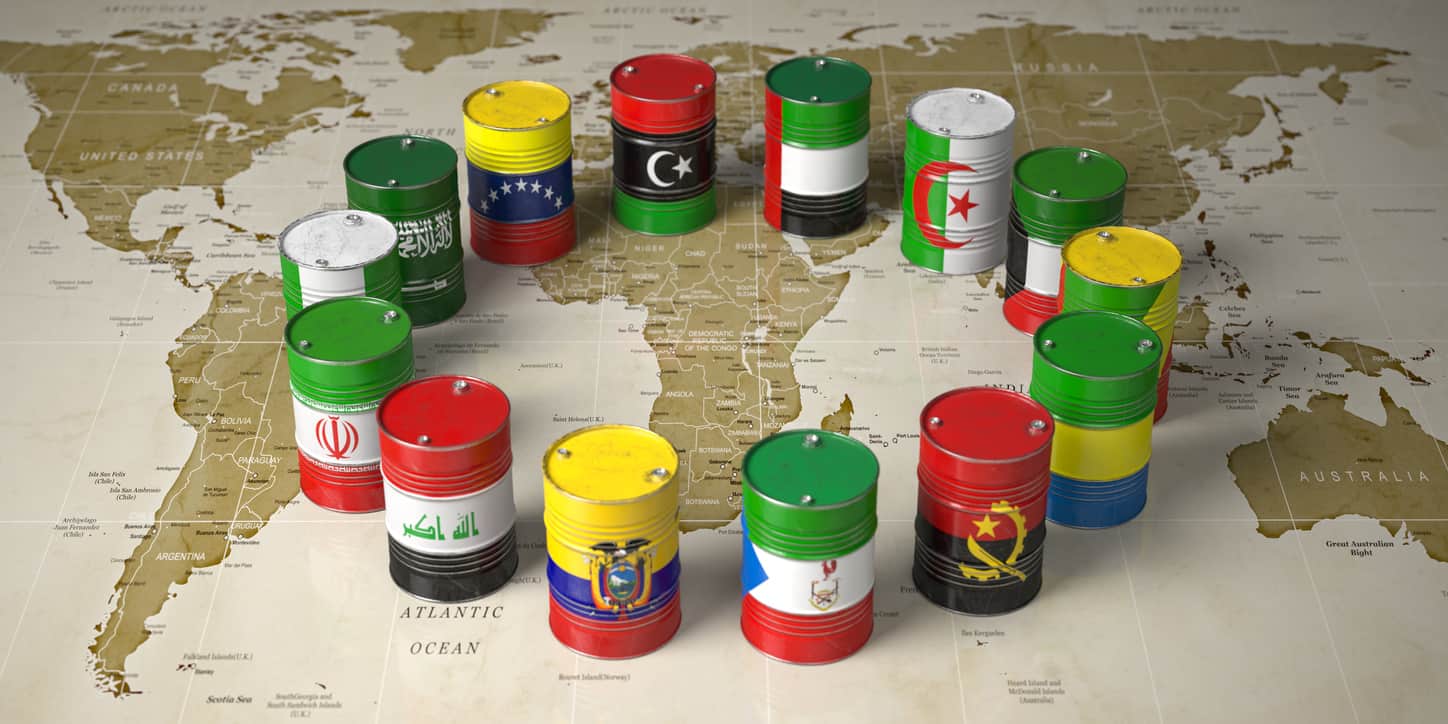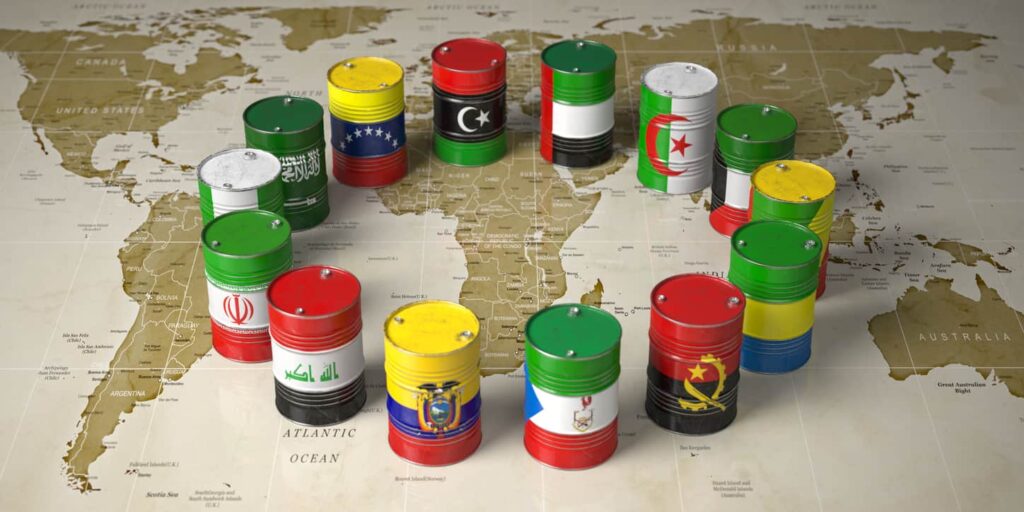
As a novice trader, you might have come across the acronym OPEC and wondered what is OPEC oil. By understanding OPEC’s history, goals, membership, and impact, individual traders can better understand the organisation’s importance and role in the global economy.
In this article, we will provide a brief overview of OPEC, its history, goals, members and influence on oil supply and prices.
Understanding OPEC
The acronym OPEC stands for the Organization of the Petroleum Exporting Countries, a powerful intergovernmental force in oil production. OPEC’s main aim is to manage the supply and pricing of oil so that petroleum is consistently available to consumers around the globe.
Established in 1960 at the Baghdad Conference, the Organization of the Petroleum Exporting Countries (OPEC) initially included Iran, Iraq, Kuwait, Saudi Arabia, and Venezuela. Since then, the number of member countries has increased.
Today, comprising 13 members, OPEC is a significant force in the global energy market. Members Algeria, Angola, Congo, Equatorial Guinea, Gabon, Iran, Iraq, Kuwait, Libya, Nigeria, Saudi Arabia, United Arab Emirates and Venezuela are all major oil producers that collectively control a sizable portion of the world’s oil supply. Because they govern the pricing of oil and other commodities, their decisions can significantly impact the global energy market.
The Role of OPEC
The primary role of OPEC is to coordinate and unify the petroleum policies of its member countries to obtain a fair and constant price for oil producers while maintaining an efficient, economic, and consistent supply for consumers.
OPEC works to keep prices stable while guaranteeing its members a reasonable rate for their oil. It also carefully monitors both production and demand of the commodity worldwide to achieve a balanced equilibrium.
While OPEC’s decisions can significantly impact oil supply and prices, the organisation must ensure they do not disrupt the global market.
The success of OPEC in achieving its objectives depends on its ability to manage oil supply and demand effectively. As such, the organisation works closely with its members to create strategies that maximise their benefits while minimising the risk of market disruption.
The organisation also promotes dialogue among major oil-producing countries and encourages them to work together. In 2019, a platform used for the collaboration of information was established, named the Charter of Cooperation.
Benefits and Drawbacks of OPEC
Since OPEC has such a tremendous influence on the global energy market, there are both benefits and drawbacks to OPEC’s approach to controlling oil prices.
One of the main benefits OPEC brings is that it helps stabilise the international oil market by balancing the supply and demand for oil. This helps create more stable prices for oil and other commodities and protects consumers from sudden price changes. Additionally, it allows poorer countries to benefit from higher prices for the oil they produce.
However, one of the main drawbacks of OPEC is that its policies can lead to higher inflation and economic instability in oil-producing countries. It can also create an environment of dependency in which countries rely on oil exports, leading to decreased economic diversity.
Also, OPEC’s policies can encourage speculation, leading to higher prices and volatile market conditions.
Overall, OPEC has significantly impacted the global economy, and its policies will continue to shape the international oil market for years. While there are some benefits to OPEC’s approach to managing oil prices, there are also some drawbacks to be aware of as a trader.
Important OPEC News Events
OPEC meets at least twice a year to review production levels, assess market fundamentals and make the necessary adjustments to ensure stability in the global oil market. During these meetings, members consider factors such as global demand for oil, inventories, and compliance with the agreed-upon production quotas.
OPEC’s decisions can significantly impact the global energy market and directly influence the price of oil and other commodities.
Another factor that OPEC considers when making its decisions are crude oil inventory reports. These reports provide information on how much oil is being stored by oil-producing countries and allow the group to adjust production quotas accordingly.
Crude oil inventories can reflect either an oversupply or undersupply of oil in the global market. These reports are essential in helping OPEC to keep the global oil market balanced. Oil traders closely monitor these reports to help with their decision-making.
Two of the most significant crude oil inventory reports are issued weekly by the United States Energy Information Administration (EIA) and American Petroleum Institute (API).
The EIA report, which comes out every Wednesday at 10:30 am Eastern Time (ET), lists detailed information regarding levels of stocks, production, imports, and demand for both crude oil and petroleum products.
The API report – released every Tuesday at 4:30 pm ET – gives a snapshot of US Crude inventories, imports and production of petroleum products for the prior week and is monitored closely by market participants to get a sense of global supply and demand dynamics in the oil world.
In summary, OPEC meets regularly to discuss production quotas and to analyse current market data to ensure stability in the global oil market. Crude oil inventory reports are an essential tool used by OPEC to accurately assess the state of the worldwide oil market and adjust production quotas accordingly.
Related Articles
Conclusion
In conclusion, the Organisation of Petroleum Exporting Countries (OPEC) is an influential intergovernmental body that works to maintain a balance between oil supply and demand while keeping prices stable and supporting economic growth worldwide.
While it has some critics, OPEC continues to be an important part of the international energy market, and its policies play an integral role in shaping the global economy.
Through its production quotas, monitoring of the global market and crude oil inventories, OPEC has become a powerful force in the worldwide energy market. Understanding how OPEC works and its role in the international economy is essential to appreciate its immense influence and importance.
Forextraders' Broker of the Month
BlackBull Markets is a reliable and well-respected trading platform that provides its customers with high-quality access to a wide range of asset groups. The broker is headquartered in New Zealand which explains why it has flown under the radar for a few years but it is a great broker that is now building a global following. The BlackBull Markets site is intuitive and easy to use, making it an ideal choice for beginners.

